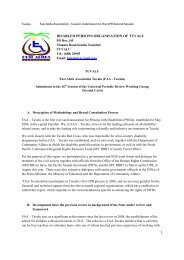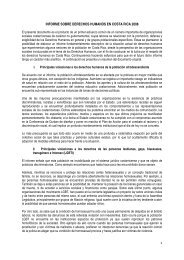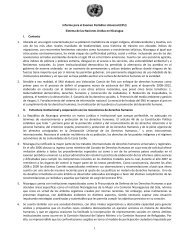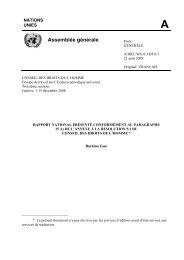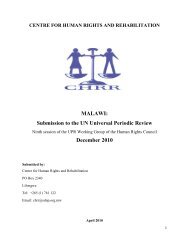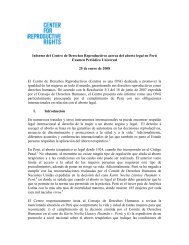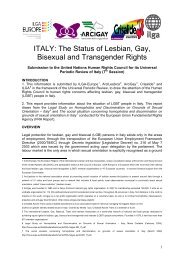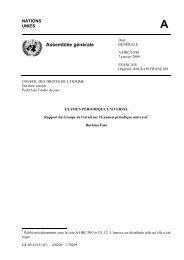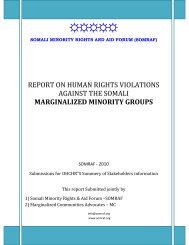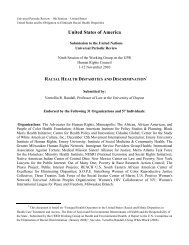JOINT STAKEHOLDERS REPORT ON - Universal Periodic Review
JOINT STAKEHOLDERS REPORT ON - Universal Periodic Review
JOINT STAKEHOLDERS REPORT ON - Universal Periodic Review
You also want an ePaper? Increase the reach of your titles
YUMPU automatically turns print PDFs into web optimized ePapers that Google loves.
Dalit women is 922 / 1000 compared to 927 / 1000 for rest of the population in<br />
India(http://imadr.org/en/pdf/CERD-India.pdf). Due to poverty, Dalit women are<br />
malnourished and anemic. One 2007 study in six north Indian states found that 61 per cent of<br />
maternal deaths were among Dalits — as ―untouchables‖ are now called — and the<br />
indigenous people known here as tribals, Human Rights Watch said. Health services are<br />
either not available in case of illness or unaffordable even if available. In addition to that, due<br />
to early marriage and too many pregnancies their health is always at risk. If birth control is<br />
practiced at all, 91% cases of tubectomy are performed on the women who have to carry the<br />
burden of family planning. In an overall situation where Dalits are prone to ailments in<br />
general, women suffer from more serious and more varied kind of sickness. More than 80%<br />
of women in reproductive age group (15 to 45) are anemic. Poor health status of Dalit women<br />
pushes her then into more vulnerable situation. Dalit women continue to face discrimination<br />
in access to State sponsored health facilities. For example, Dalit women are forced to sweep<br />
and clean the hospital premises when they go for treatment.<br />
Political status<br />
In the year 1993, 73rd amendment in the constitution granted reservation to Dalits, tribals and<br />
women in local government. This amendment made it compulsory that one third of the seats<br />
reserved for Dalits be filled by Dalit women. In some states, there has been little or no<br />
acceptance of Reservation for the lower castes and Dalit women by the upper castes. This has<br />
resulted in atrocities against panchayat members including women. Dalits who stood for<br />
election were beaten, and Dalit women were raped and ill-treated. The members of the higher<br />
castes, who are not prepared to relinquish power to the lower castes, grabbed their land. An<br />
easier method to retain power is to put-up proxy candidates but keep the control in the hands<br />
of the dominant castes, always men.<br />
The incapacity of women, particularly Dalit women, to assert their rights is at the root of the<br />
problem. The reservation for Dalits, particularly for women, is accepted in form but seldom<br />
in substance. Any change in the status quo is resisted. Dalit women‘s sitting on chairs is seen<br />
as threat to social hierarchy. So, the upper castes in the village vetoed chairs in the panchayat<br />
office. Dalit women also faced many problems in performing their duties due to illiteracy,<br />
lack of information and dependency on the male members of their families. An important<br />
obstacle is the no-confidence motion against Dalit women as pradhan by the dominant<br />
sections. Rural elites are unable to accept the power, which has been given into the hands of<br />
the poorer and disadvantaged women. Despite recognition and legal sanction for political<br />
rights, rigid caste system and patriarchy directly and indirectly has been suppressing Dalit<br />
women and violating their political rights.<br />
This proves that human rights of Dalit women are violated right from her family to the<br />
society at large by one and all. All these factors are largely responsible for the precarious<br />
position of Dalit women as far as their social, cultural, religious, economic, health and<br />
political status in the society is concerned. These factors force them to mutely allow violation<br />
of their civic and human rights and question the human security for Dalit women in India.<br />
44



